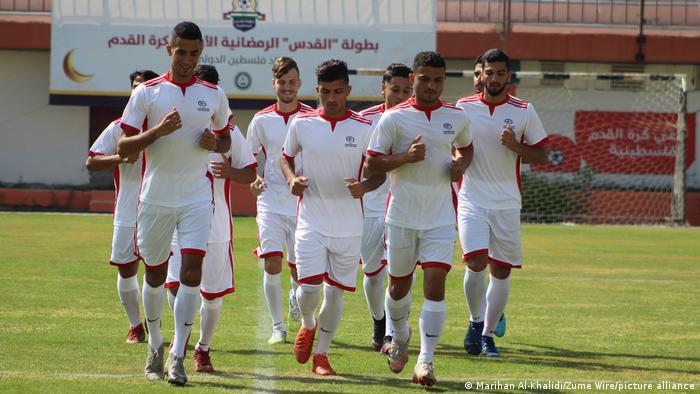
Gaza: On June 15, Palestine defeated Yemen 3-0 to finish third in Group D behind Asian powerhouses Saudi Arabia and Uzbekistan in the second round of qualification for the 2022 World Cup.
It was a fine performance that suggests what the team could do if it did not have to deal with challenges and obstacles that their rivals do not even have to consider. Such challenges became bigger in May.
The world watched as the prospect of forced evictions of Palestinian families from East Jerusalem and the storming of Al-Aqsa mosque by Israeli forces produced a spark of anger that led to an explosion of violence in Gaza. The conflict led to the death of 256 Palestinians, according to figures published by the Reuters news agency on May 21, the day of the ceasefire.
During that ordeal, football may not have been uppermost in the minds of the two million inhabitants in Gaza also dealing with high levels of unemployment and COVID-19. The national team has, however, been one of the few international symbols of Palestine (given non-member observer state status at the United Nations in 2012) since it was recognised by football’s world governing body FIFA in 1998. When the team qualified for the 2015 Asian Cup for the first time, thousands took to the streets of Gaza and the West Bank to celebrate.
According to Noureddine Ould Ali, Palestine's head coach from 2018 until he was fired after a 5-0 loss to Saudi Arabia in March, the passion is there, but so are obstacles that prevent the national team reaching its full potential.
“Whether it is football or something else, without peace you can’t do anything and there is no peace in Palestine," Ould Ali told DW. "Palestinians don’t live in a good situation. People can’t move easily or do anything, and this makes football very difficult."
Restrictions holding Palestine football back
Just getting the players together is hard. Players in the Gaza and West Bank Premier Leagues need exit permits to pass through Israeli military checkpoints. Even if these are granted, this can take time. Exit permits are also needed as the Palestine Football Association (PFA), in a bid to increase the pool of available talent, allows the coach to look to the 6 million or so overseas Palestinians or those of Palestinian descent, to come and play for the national team.
Restrictions of movement prompted then FIFA-President Sepp Blatter to demand change at a 2014 Congress, one that PFA Deputy General-Secretary Mohammed Ammassi had been unable to attend because he could not leave Gaza.
"I call on the Israeli government to facilitate this movement and I go so far as to say its cooperation is crucial," Blatter said.
For Ould Ali, who was replaced as coach by his assistant, Makram Daboub, the difficulty of getting players in for training makes a tough job that much tougher.
"Palestine need to have a good vision to improve, but it is hard to do that when everyday your life is difficult, and just getting a team together is a challenge. Some players can’t get into Palestine or out of Palestine easily because every time they need a permit which can be hard to get.”
The Algerian coach also struggled. "Every time I needed a permit, and often the Israeli forces stopped me going into Palestine. I had to wait at checkpoints for four, five, six, eight hours or more. This is not a problem that other head coaches have to deal with, but then I chose this life and this job.”
Violence makes it worse
With World Cup qualification coming to a head in June, May’s violence made a difficult situation worse. On May 17, Asian Football Confederation President Sheikh Salman bin Ebrahim Al Khalifa issued a statement expressing his condolences to the family of Muath Al-Zaanin after the PFA confirmed that the midfielder had been killed in an Israeli airstrike.
"The psychological aspect had a huge impact due to either the loss of the home or family members," said Ihsan Ramadan of the PFA.
It is not just about the national team. When referees and officials are unable to attend local games in Gaza or the West Bank, the matches are canceled. The bombings stopped all football activities, but even normal restrictions make international engagement difficult according to Ramadan.
"The obstacles restrict the chance of all football bodies — players, referees, coaches — of gaining more international experience either by traveling abroad for courses and camps or by receiving other football organizations to help educate and spread knowledge of football in Palestine," she said.